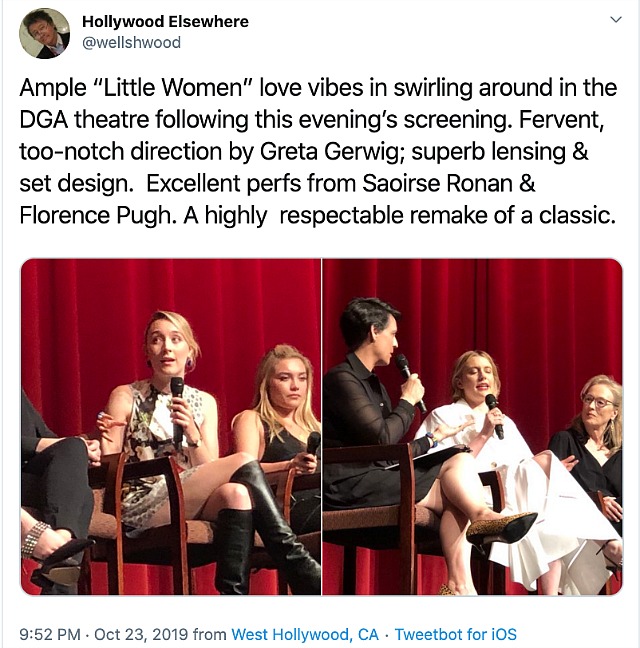
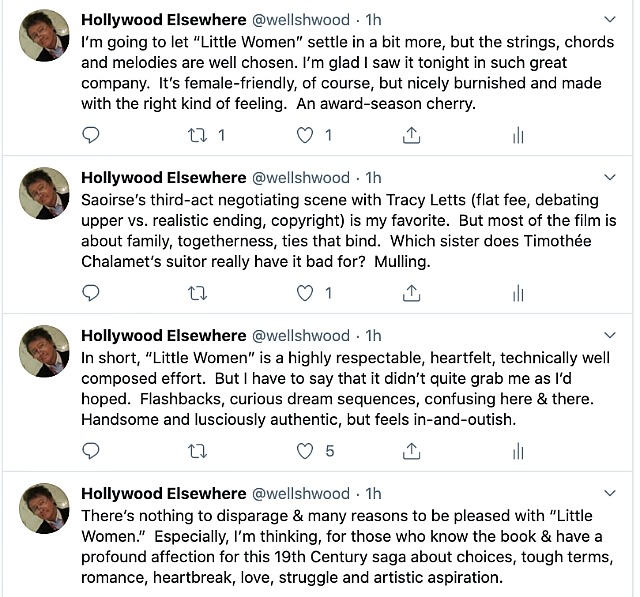
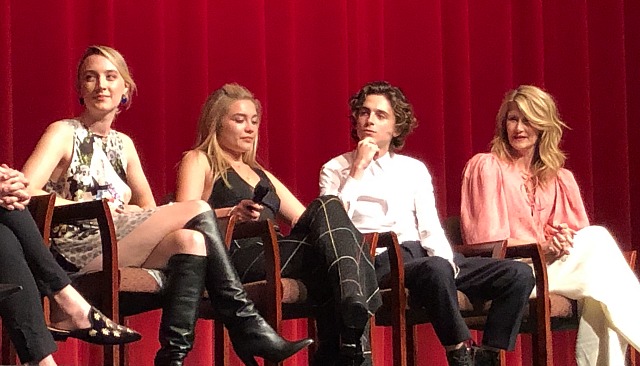
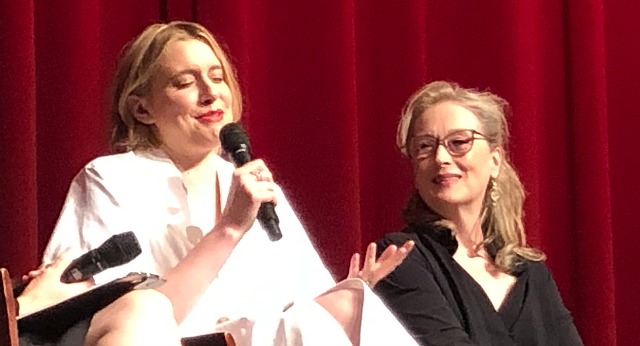
On the set of One-Eyed Jacks, sometime in the fall of ’59. I presume they were speaking French, which Brando became fluent in…uhm, sometime in the early to mid ’50s.
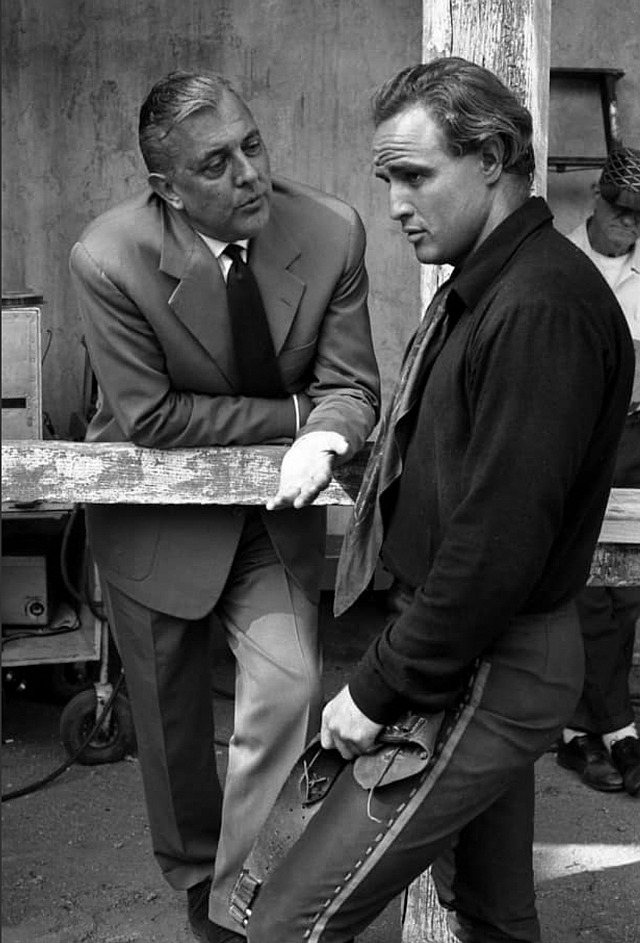
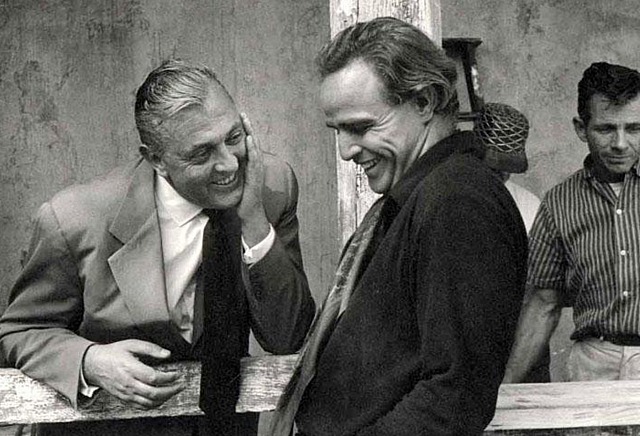
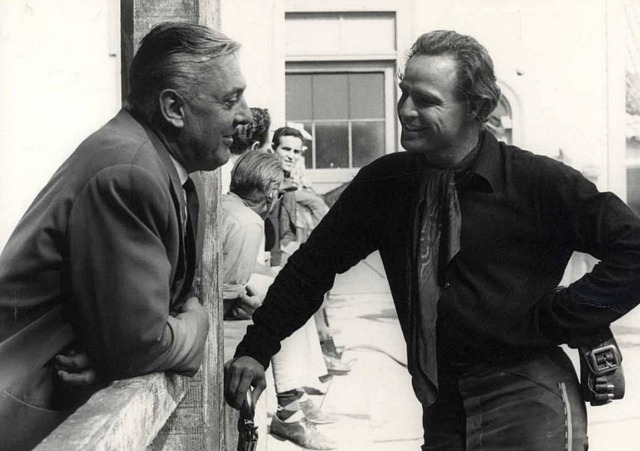
Trombone duet at the SE corner of M Street and Wisconsin Avenue on Monday, 10.21, around 9:30 pm, give or take. If anyone can identify the tune these guys are playing, please advise.
New York journo hotshots will get the very first peek at Sam Mendes‘ 1917 on Saturday, 11.23. Their Los Angeles brethren will see it the next day (Sunday, 11.24) via “multiple” screenings in the afternoon and evening.
Thanksgiving, by the way, will happen on Thursday, 11.28. Why so late? Because Thanksgiving had been celebrated on the last (or fourth) Thursday of the month since the time of Abraham Lincoln. I say that 11.28 is too late — it should happen on Thursday, 11.21.
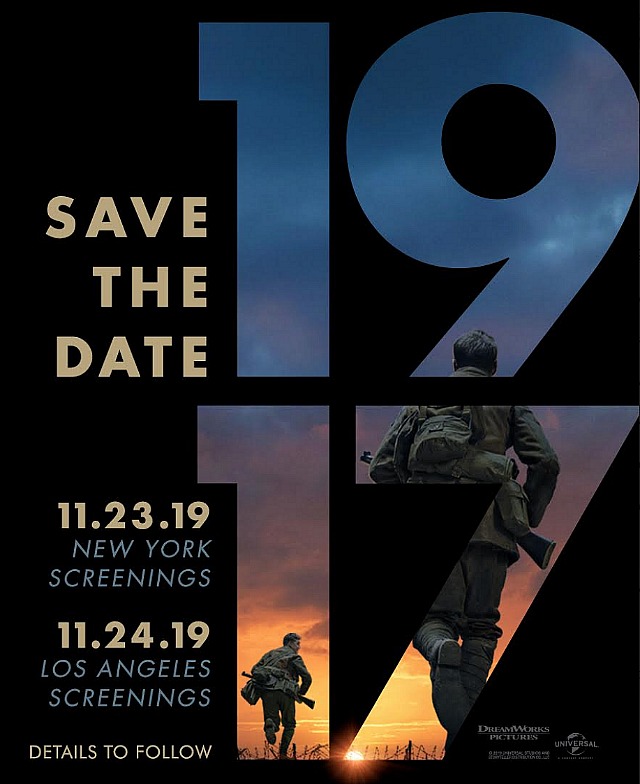
Here’s the original Ed Bradley 60 Minutes report (aired on 11.22.92) about the rash and wrongful imprisonment of Walter McMillian on a murder charge. Lasting 14 minutes, it covers most of the same material that you’ll find dramatized in Just Mercy (Warner Bros., 12.25).
One of the things that Bradley’s report mentioned but that Daniel Destin Cretton’s film doesn’t explore much is the fact that McMillian had been having an affair with a white woman, Karen Kelly, and that one of his sons had married a white woman.
Both McMillian and the attorney he had in 1987, J.L. Chestnut, “contended that Mr. McMillian’s relationships alone had made him a suspect.” In a N.Y. Times prison interview in 1993, McMillian said, “The only reason I’m here is because I had been messing around with a white lady and my son married a white lady.”
The McMillian-Kelly relationship was reported and discussed in Bryan Stevenson‘s “Just Mercy: A Story of Justice and Redemption,” the 2015 book that the film is based upon.
Why does Just Mercy mostly ignore the McMillian-Kelly backstory? Mainly, I’m guessing, because McMillan’s sexual history would have compromised the pure-of-heart aura that Cretton and co-screenwriter Andrew Lanham wanted to project. It might have also lessened the sympathy factor among POCs…who knows?
I’m not spoiling by stating that Destin Daniel Cretton‘s Just Mercy (Warner Bros., 12.25), a fact-based legal drama that I caught during last weekend’s Middleburg Film Festival, ends on a positive note. Due to the efforts of a good-guy lawyer (Michael B. Jordan‘s Bryan Stevenson), a falsely-convicted innocent man (Jamie Foxx‘s Walter McMillan) doesn’t rot in an Alabama jail for the rest of his life.
But McMillan’s climatic moment of salvation, which happens in the Alabama Court of Criminal Appeals, doesn’t entirely work. Because Joel P. West‘s score lays it on too thick — the emotional “Hallelujah” sauce by way of a church choir and an orchestra working its ass off. It’s the only moment in the film that feels like it’s pushing too hard — the rest of it feels suitably restrained and more or less on-target.
I’m not dropping the Just Mercy grade because of West’s “oh dear God” music — it still gets an A minus or at least a B plus. But composers have to be careful not to overplay their hand. Because the right or wrong kind of music at a key moment in a film can make or break, regardless of how good or expert the overall effort might be.
To further my point I’ve pasted Max Steiner‘s main title music for Mervyn LeRoy‘s The FBI Story (’59). On one hand it’s a decent but flat-footed saga of an FBI agent’s (James Stewart‘s Chip Hardesty) career with the bureau; on another it’s a J. Edgar Hoover-approved propaganda film that Hoover almost literally co-directed. It feels like a stodgy chest–beater.
But Steiner’s music, at least during the opening credits, makes you say “wow, okay…maybe this film had some good points that I missed.” It’s spirited and proud-sounding in a marching-band way.
The Austrian-born Steiner (1888-1971) was pushing 70 when he composed the FBI Story music. His best score was for the verging-on-discredited Gone With The Wind, which he composed in his early 50s. His second and third best were for Casablanca and King Kong.
Or, in the parlance of politics and mindful of the 50% or higher support for impeachment, they’re “doing calculations” and looking over their shoulders.
The decision to push Leo’s Rick Dalton performance in Once Upon A Time In Hollywood for Best Actor is fine and appropriate, but also due-deference political. Anne Thompson knows this, of course.
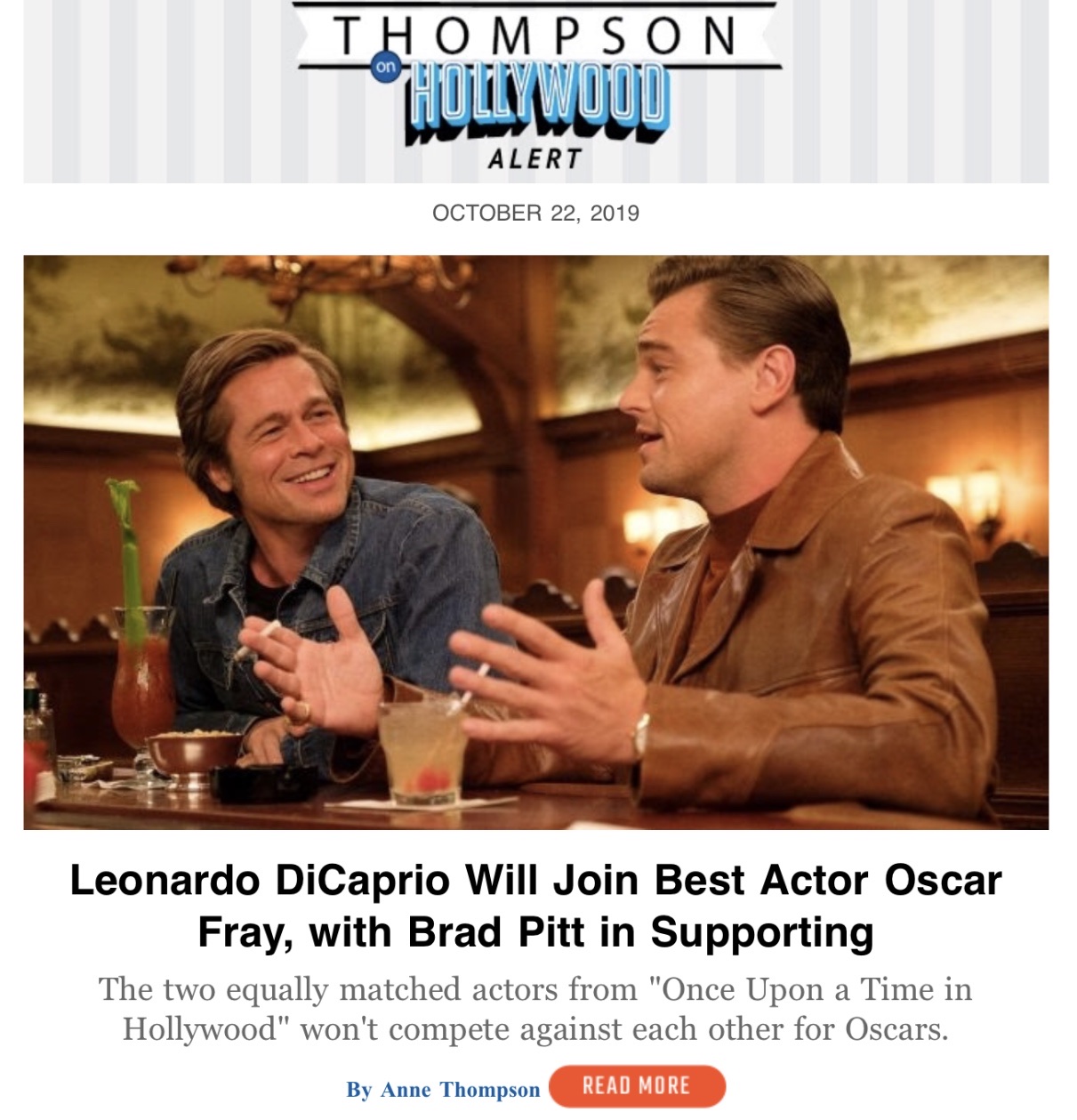
Red-and-black checkerboard jackets have been de rigeur for rugged, clock-punching proletariat types over the last century, at least. Didn’t Fred MacMurray or Henry Fonda wear one in Trail of the Lonesome Pine (‘36)? I know Marlon Brando’s Terry Malloy strolled around the Hoboken docks with a jacket like this in On The Waterfront (‘54). Last night I saw this heirloom in a Rag & Bone display window in Georgetown. Whatever L.L. Bean may have charged in its mail-order catalogue 60 or 70 years ago, it’s a safe bet that Rag & Bone has hiked the price significantly.
What kind of Millennial idiot would shell out for this? I wouldn’t wear this muttonhead garment on a bet.
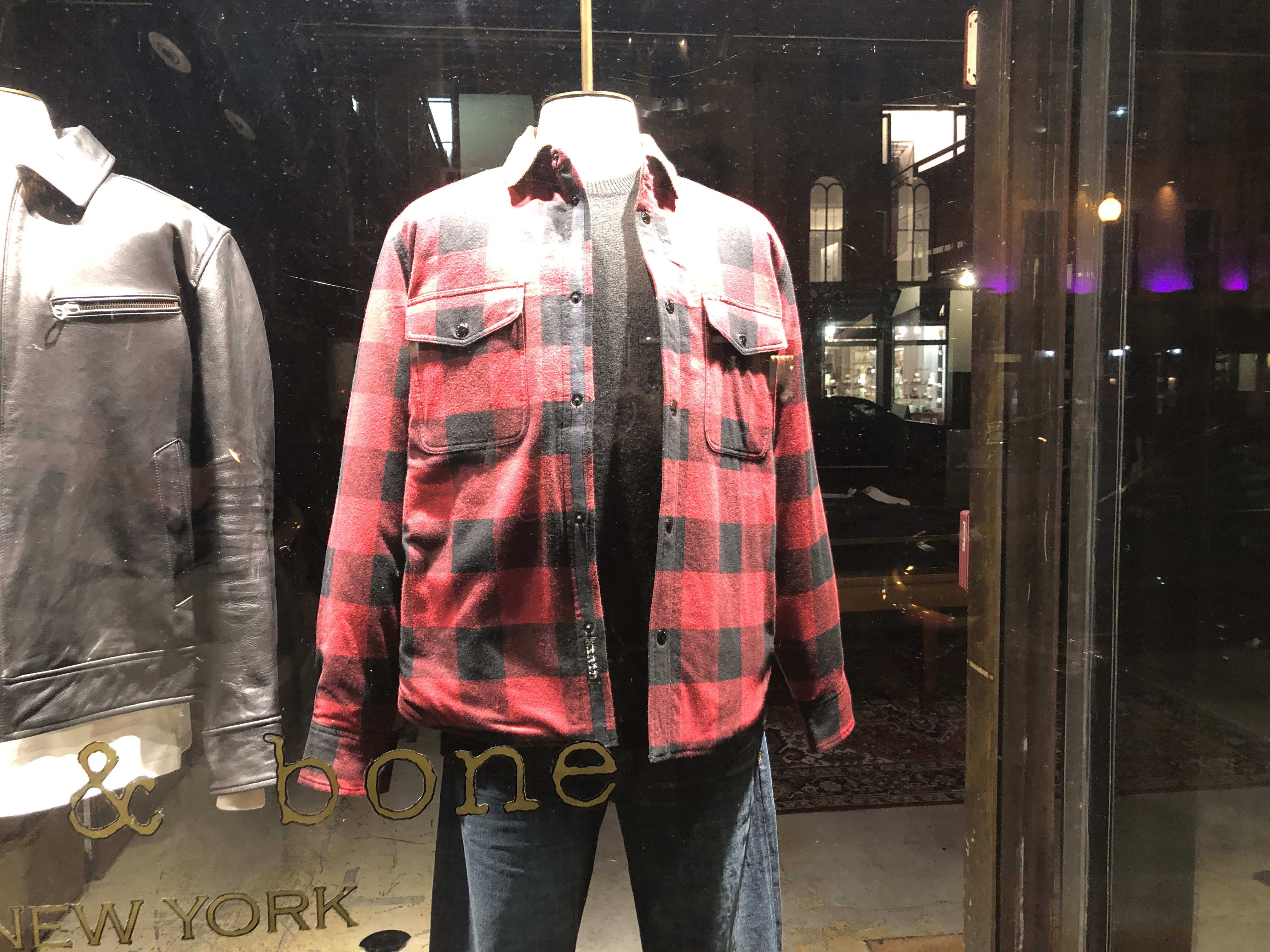
Sometime in early ’79 I worked as a manager or co-manager of the Carnegie Hall Cinema. It was such a fascinating and blessed place to work in that I didn’t mind being paid next to nothing. It was easily my second favorite job of my 20s, the first being a Checker Cab driver in Boston, which yielded intrigue and adventure on a daily basis..
My employer was the late Sid Geffen, the eccentric, moustachioed real estate hotshot who had launched a not-for-profit repertory cinema company (the Center for Public Cinema), and at the time was running both the Carnegie and Bleecker Street Cinemas.
[Click through to full story on HE-plus]
10 and 2/3 years ago (or on 3.20.09) Variety‘s Chris Willman wrote a fascinating account of a confrontation between Bound for Glory‘s David Carradine, Ronny Cox and Haskell Wexler. It happened after a screening of Hal Ashby’s 1976 film at the Aero theatre.
Bound for Hell, or Glory, at the Cinematheque by Chris Willman:
Not since I saw Bill Irwin and Kathleen Turner go at each other in an excellent production of Who’s Afraid of Virginia Woolf? a couple of years ago have I experienced a night of live theater quite as riveting as the three-way cage match between David Carradine, Haskell Wexler and the audience the other night following an American Cinematheque screening.
What a nerve-wracking, weird and wonderful night this was. The following is going to be way more exhaustive than most of you will want. But for the few who really wanted to hear about the whole thing, by request, here goes…
If there’s anything that doesn’t exactly seem to scream “fireworks!,” it’d be a panel discussion about the 1976 Woody Guthrie biopic Bound for Glory, which at this date probably counts as one of the less remembered works of the late, great Hal Ashby. As much as I love Ashby, I’d never seen it, and I have a hard time forcing myself to watch slow-moving two-and-a-half hour movies unless I’ve committed myself to a seat in front of a big screen. So I just barely dragged myself out of the house for the 30-mile drive to the Aero.
Caption for below photo: (l. to r.) Bound for Glory costar Ronny Cox, moderator Kevin Thomas, star David Carradine.
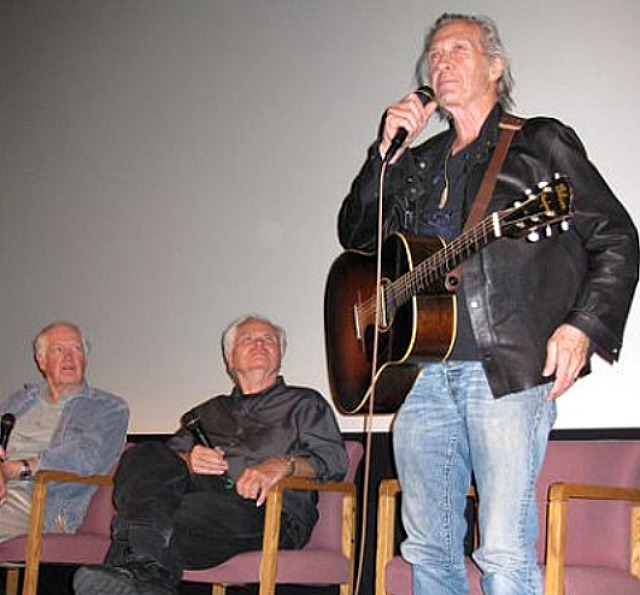
I knew there’d be a discussion afterward with Carradine, but my plan was to skip it and go from there to a late show of Watchmen in Westwood. I luckily decided otherwise. Imperfect as Glory is, it does a fantastic job of plunging you into the (previous) Depression, and it’s so utterly and engagingly human that I feel like washing its taste out of my mouth with a comic-book extravaganza would be opening myself up to eternal damnation. So I stayed for the discussion, and narrowly averted what might have been one of the great regrets of my life.
I should say that there has already been some weirdness during the screening itself. During a scene where a radio guy reminds Carradine’s Arlo Guthrie that he’s not allowed to sing any controversial or topical material on his program, somebody very loudly exclaims, “I hate guys like that!” It gets a big laugh from the audience. But soon the same guy is keeping up with a line of patter, which I can’t make out because he’s on the other side of the auditorium. As you’d expect in a repertory screening, very quickly there are cineastes yelling at the rube to shut the hell up, and some kind of verbal altercation seems to ensue for about a minute.
Of course, as soon as the lights come up, Carradine is walking down the aisle with his acoustic guitar, already going off on some kind of rant before he gets to the stage, and everyone realizes he was the one providing live commentary for his movie. (As the late noir character actor Lawrence Tierney once drunkenly did, in this same theater, in a night that is beloved in Cinematheque lore.) At this point I sense people in the audience feeling embarrassed to realize that The Star Of The Show had been shouted down like a common heckler, though some of these sympathies are about to diminish…
The screening is part of a “Kevin Thomas’ Favorite Films” series, hosted by the former (and occasionally still) L.A. Times film critic, who I knew back in my own Times days. I don’t know what Kevin has been like as a moderator on the other nights, but during the ensuing 70 or 75 chaotic minutes, he seems to go into shock and utters all of about 50 words. The first nine of them being “I understand Ronny Cox is in the audience tonight?” Indeed, Carradine’s costar has shown up just to see the film, and, so bidden, walks toward the stage — joining another surprise guest, Haskell Wexler, one of the half-dozen or so most revered living cinematographers, and an Oscar winner for the movie. Carradine and Cox warmly embrace, the former enthusing about how he couldn’t have gotten through without the latter as his partner, and the lovefest begins!
Or the monologue, actually. For the first 20 minutes or so, Carradine does 98% of the talking — hell, maybe 99% — and it’s entertaining as all-get-out, in a had-too-many-highballs-before-dinner kind of way. As the star goes on with his anecdotes, Cox is probably thinking he could have stayed in his original seat, and Wexler keeps slinking further down in his chair, as those of us who know this particular d.p. does not suffer fools gladly wonder what kind of storm clouds might be forming in his head.